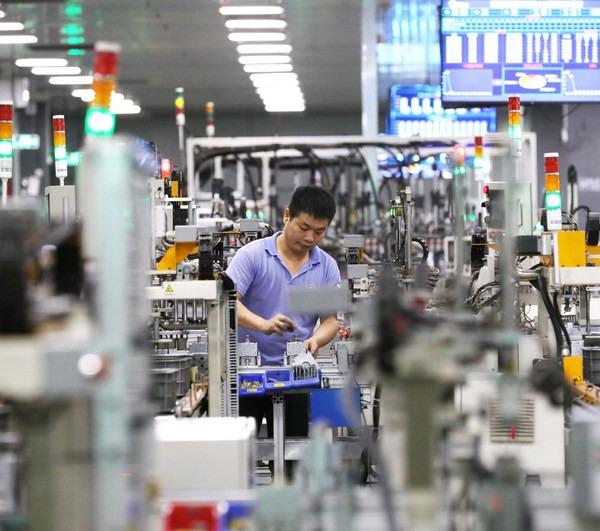BEIJING, Aug. 31 (Xinhua) -- China saw its manufacturing activity expand at a slower pace in August, contributing 50.1 to the purchasing managers' index (PMI) for the manufacturing sector, data by the National Bureau of Statistics (NBS) showed Tuesday.
A reading above 50 indicates expansion, while a reading below 50 reflects contraction.
While the August reading remained in the expansion zone, it edged down from 50.4 in July, due to factors such as domestic COVID-19 cases and the flood situation in recent days, said Zhao Qinghe, a senior statistician with the National Bureau of Statistics.
The sub-index for production stood at 50.9 in August, down 0.1 percentage points from a month earlier, according to the NBS data. This indicates the stable expansion of production in the manufacturing sector, said Zhao.
The NBS data also showed that market demand has weakened with the sub-index for new orders down 1.3 percentage points from July to 49.6 in August. Analysts attributed the dampened demand to the off-season effect on the manufacturing industry in August, as well as the high base in the previous period.
Some enterprises surveyed also said that factors including COVID-19 and floods hampered the delivery of raw materials and products, prolonging the production cycle and affecting new orders, according to Zhao.
However, the surveyed companies believed that as the impact of the epidemic and floods gradually tapers off, business operations will normalize soon.
Enterprises in the manufacturing sector have "stable confidence" in market prospects, Zhao noted, citing a sub-index of 57.5 tracking business activity expectations.
Tuesday's data also showed that the PMI for China's non-manufacturing sector came in at 47.5 in August, down from 53.3 in July. The figure fell below the boom-bust line for the first time since March last year, according to the NBS.
A breakdown of the data shows that the sub-indexes for sectors including road and air transportation, hotels, catering, culture, sports and entertainment dropped below the boom-bust line.
The recent round of scattered COVID-19 cases across provinces has severely impacted the service sector, which is still recovering, Zhao noted. The business activity index for the service industry plunged 7.3 percentage points from July to 45.2 in August, the data showed.
During the period, the construction industry recorded strong performances as construction activities picked up, with the sub-index for business activities hitting 60.5 in August, up 3 percentage points from a month earlier.
The sub-index tracking business activity expectations for the non-manufacturing sector stood at 57.3 percent in August. This shows that as epidemic-control efforts take hold and the Mid-Autumn Festival and National Day break approach, businesses are optimistic about the recovery of the service sector, Zhao noted.
Looking at the next month, manufacturing industries such as automobiles and home appliances are likely to enter peak season in September if there is no massive resurgence of COVID-19 cases, Wen Tao, an analyst with the China Logistics Information Center, said.
This will support demand growth in the manufacturing sector and drive related production and purchase activities to expand. In the meantime, the country should step up efforts to ensure supply and stabilize prices of bulk commodities in order to relieve the burden on enterprises which still face the pressure of high raw material costs, Wen added. Enditem




 A single purchase
A single purchase









